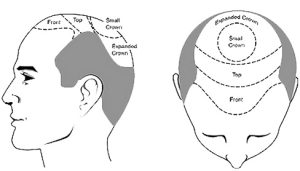Hair loss can significantly impact self-esteem and overall quality of life. For many, hair transplantation presents an effective solution to restore a fuller head of hair. However, not everyone is a suitable candidate for the procedure. Understanding who makes the best candidates for hair transplantation is crucial for achieving optimal results. In this article, we will explore the key factors that determine whether you are an ideal candidate for a hair transplant, including age, hair type, and other essential considerations.

1. Understanding Hair Loss
Before delving into the criteria for candidacy, it’s important to understand the different types of hair loss. The most common form is androgenetic alopecia, often referred to as male or female pattern baldness. This type of hair loss is hereditary and can begin as early as the late teens or early twenties. Other factors that contribute to hair loss include stress, hormonal changes, medical conditions, and certain medications.
2. Age Considerations
While age itself is not a strict barrier to hair transplantation, it plays a significant role in determining candidacy. Generally, candidates should be at least 25 years old.
a. Younger Candidates
Younger individuals, particularly those in their late teens or early twenties, may experience ongoing hair loss. Opting for a hair transplant at this stage can be risky, as future hair loss can lead to an unnatural appearance. It is often advisable for younger candidates to explore non-surgical options or wait until hair loss stabilizes.
b. Middle-Aged Candidates
Individuals in their 30s and 40s are often ideal candidates. By this age, the pattern and extent of hair loss are usually more stable, allowing for a more accurate assessment of the hair transplant’s potential effectiveness.
3. Hair Type and Quality
The type and quality of your hair are critical factors that influence the success of a hair transplant.
a. Hair Density
Candidates with thicker hair density are generally better suited for transplantation. A higher density provides more coverage and can result in a fuller appearance post-surgery. Conversely, individuals with fine or thin hair may require more grafts to achieve the same results, which can be a limiting factor.
b. Hair Color
The contrast between hair color and scalp color also affects the aesthetic outcomes of hair transplants. Those with dark hair on light skin may experience more noticeable results compared to individuals with light hair on a light scalp.
4. Scalp Condition and Health
A healthy scalp is crucial for successful hair transplantation. Candidates should have a sufficient amount of donor hair available, typically located at the back of the head.
a. Scalp Elasticity
Good scalp elasticity is essential for the extraction of donor hair. Individuals with tight or scarred scalp skin may face challenges in this regard. A thorough examination by a qualified surgeon can determine whether your scalp is suitable for transplantation.
b. Overall Health
Good overall health is vital. Candidates should not have any underlying medical conditions that could interfere with the healing process, such as autoimmune disorders or diabetes. A thorough medical evaluation will help identify any potential risks.
5. Realistic Expectations
Setting realistic expectations is key to the satisfaction of hair transplant candidates. It is essential to understand that while hair transplantation can provide significant improvements, it may not restore a full head of hair like in youth.
a. Consultation with a Professional
A comprehensive consultation with a qualified hair transplant surgeon can help determine candidacy. Surgeons will assess your hair loss pattern, scalp condition, and overall health to create a tailored treatment plan that meets your needs.
6. Psychological Readiness
The psychological aspect of undergoing a hair transplant should not be overlooked. Candidates should be prepared for the emotional journey that comes with hair restoration. Having realistic expectations about the results and understanding that the process takes time is crucial for mental well-being.
7. Long-Term Commitment
Hair transplantation is not a one-time solution; it requires long-term commitment. Candidates must be willing to follow post-operative care instructions and may also need to consider ongoing treatments to maintain hair health and prevent further loss.
Conclusion
Determining the best candidates for hair transplantation involves assessing various factors, including age, hair type, scalp condition, overall health, and psychological readiness. By understanding these criteria, potential candidates can make informed decisions about whether a hair transplant is the right solution for them. Consulting with a qualified hair transplant surgeon is essential to evaluate your suitability and create a personalized plan to achieve your desired results.
